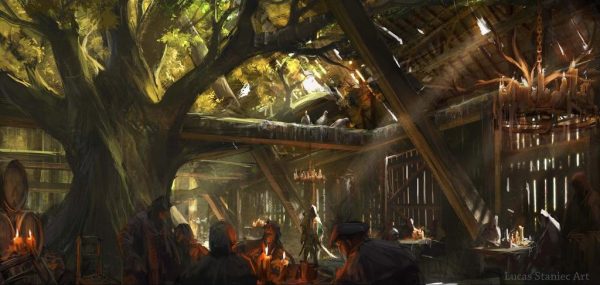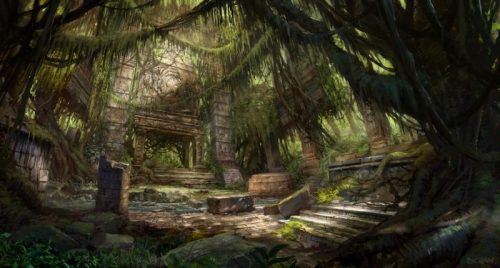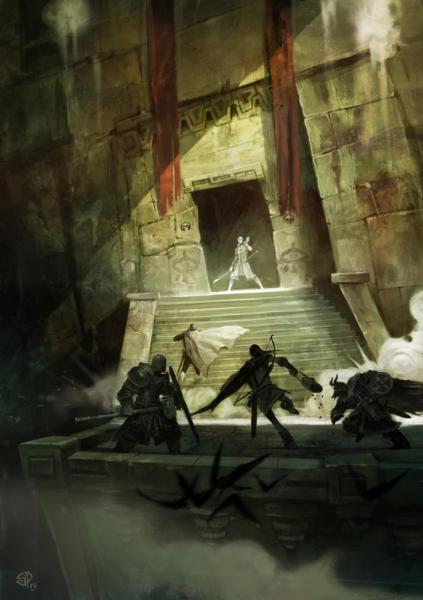Silly title? Probably. It’s not easy being both snappy and clever all the time.
The first step in creating a new setting is always to think about which existing works you draw your main inspirations from and serve as your primary references. It may be fully unconcious for many people, but you can’t create something new from nothing. The second thing that I think everyone should do, but a great many number don’t, is to give it some thought what your new creation is supposed to be about. Lots of fictional worlds, especially in RPGs, are not really about anything. And that’s the main reason why they are bland, boring, indistinguishable, and ultimately forgettable. With past settings I did make this crucial step, but then I immediately went ahead creating lots of content without really paying any attention to the themes. And the campaigns ended up simply being okay, not very memorable, and feeling somewhat generic. (Though I also partly blame this on sticking with D&D-derivative systems.) Self-awareness being the first step towards self-improvement and all this, now is another opportunity to do better.

I’ve already been doing a good amount of preliminary work on the setting, and out of the many ideas I came up with and threw out, some general overall themes did emerge. The core idea, that has fascinated me for years, is that complex human cultures throughout all of history have regarded themselves as the pinacle of creation. Beings so far above all other living things that they exist outside of the natural order and nature in fact exists to serve man. Above them are only the gods, who are immortal and live in realms removed from the world. But among the living things on Earth, man stands above everything, and man will live on even after death, in the realms of the gods. This seems to be almost universal among civilizations, with exceptions being small isolated cultures that live in places where the environment has not been transformed into farmland and cleared of most dangerous predators. Yet for the last generation or two, there has been a growing awareness and understanding in western culture that we can’t bend nature to our will, and it’s not a matter of developing better technologies. Instead of adapting to local environmental conditions, we have tried to force the environment to change to suit our needs. But nature doesn’t care about or needs, which directly led to many of the worst natural disasters of human history. Some people even go so far to say that there are no “natural disasters”. Nature just does what it always did, disasters only happen when people put their houses in the paths of natural forces or think they know how to improve the environment for their own benefit. We’ve had plenty of fiction over the last decades about a world altered so much by humans that it became inhospitable to humans. And now the survivors have to learn to live with the new conditions. Or they don’t. My idea for the main theme of this setting is a world with natural forces so strong, forests growing so fast, and beasts getting so big that it was never suited for civilizations. The spirits that rule over nature don’t care about what happens to people any more than to any other creatures, and people are far from the top of the food chain. It is a forest world with numerous small areas suitable for farming and free of most dangerous predators, but the limited space does not allow for growth or expansion beyond some tens of thousands of people. Beyond these small islands of relative safety lies a true primordial wilderness, a world that is majestic and wondrous, but also terrifying and cruel.

One major difference going into this setting compared to my previous ones is that I don’t approach it from the perspective of Dungeons & Dragons, with it’s levels, spell lists, and monster books, but from the perspective of Apocalypse World. Structurally, a world in which the environment restricts human societies from growing large is very similar to a world in which catastrophic changes to the envrionment reduced human societies to a very small scale. The situation in which people live, the needs they have, and the threats they face are mostly the same. Post-apocalyptic fiction often features extreme or even exagerated conflicts and violence because it takes place in settings of extreme or exagerated scarcity. It takes the complex and often abstract conflicts that are part of our own world, and human history as a whole, and reduces them to the very basics where everything gets much simpler. I don’t want to make this a dystopian setting where people live in misery and constant fear, but I find it very useful to approach the overall social situation, with its conflicts and factions, from the perspective of fundamental scarcities. What do people need but do not have? What motivates them to behave in certain ways that are typical for the setting? What makes them act agressive and foolish?
The first, and most simple scarcity, is a scarcity of farmland. There are only a limited number of places where the ground is suitable for growing crops, the vegetation not spreading too agressivly to clear fields, and the wildlife not too dangerous to settle downn. With farmland being limited, there is only so much food that can be produced. But even when you have enough to feed all the people, you also need to have surplus to store for bad years and to trade with other settlements. Farmland is the primary unit of wealth, and while the distances between major settlements make generally unfeasible to conquer land from neighboring settlements, it is the main source of conflict within communities. A settlement can not increase its amount of farmland, but families are constantly trying to get more land from their neighbors. The scarcity of farmland is the underlying basis for most local politics and power structures and affects who could be a potential ally or enemy to the players, and who they would have to approach to get things done.
The second scarcity is a scarcity of cooperation. Because communities are separated by often long stretches of wilderness, most of them tend to be fairly insular. Trade between settlements is a common thing, but nobody ever gets anything for free. And in times of trouble, most communities are entirely on their own. Their local trouble is not someone elses trouble. It might seem as a sensible course of action in the short term, but in the long term problems can grow into much bigger threats that endanger much larger regions. The indifference to the trouble of others is regularly a contributing factor to the rise of major threats. Cooperation is rarely given and never expected, but this also means that it is regarded with immense value when offered. Getting allies for their cause is a major challenge for the players, but the offering of assistance is a very strong bargaining chip and comes with great gratitude that may be invaluable in the long run. The difficulty in finding allies can be a frustration for players, but being persistent and taking risks will lead to immense rewards.
The third scarcity is a scarcity of understanding. It is in the nature of people to believe that they understand everything perfectly well and that they know all they need to know. But in reality, most people’s understanding of the wilderness and the supernatural is rudimentary at best and often outright false. But the confidence in their mistaken believes drives them to make decisions with terrible outcomes. Real dangers are being ignored and needless conflicts escalated because of people’s believes about how things work and what others want. Because resources are scare and the environment dangerous and often hostile, not all conflicts are caused simply by misunderstanding, and could be solved by explaining the truth. When there is not enough food, then there is not enough food. But every threat is being increased and every conflict escalated by people making decisions based on false assumptions. And it isn’t just that people are mistaken, but refuse to believe that they are mistaken. Understanding more about a situation and the creatures and spirits of the wilderness is always the most important part in dealing with a problem. Blindly charging in without a plan always makes things only worse. Attempting to communicate with the alien minds of spirits or gleaning information from the ruins and records of past settlements is always a crucial part in putting an end to threats that endanger communities.
Just yesterday I realized that these three scarcities very much overlapp with the three vices and three virtues that I picked as the basis for one of the most prominent religions of the setting. Greed, hatred, and pride are the sources of all ills. They are the reasons people do stupid things that lead to violence and disaster. Opposed to these are the virtues represented by the three gods of the religion. The God of the Fields, who represents generosity, the God of the Home, who represents hospitality, and the God of the Herds, who represents humility. The scarcity of farmland is connected to greed; the scarcity of cooperation is connected to distrust and resentment, and therefore hatred; and the scarcity of understanding is directly matching pride. Almost certainly not a coincidence, but simply the result of having thought about these and worked with them for several weeks.

Finally, it is critical to have a pretty good understanding of what kind of people the players will play, and what kinds of things they will be doing in the campaign. The themes I have decided on don’t really align with becoming powerful warriors through the fighting of many monsters and the amassing of great riches, and trying but ultimately failing to make D&D characters work in the Ancient Lands was probably the main reason that setting never led to the campaigns I envisioned. But Apocalypse World makes very different assumptions about what player characters are and what they do. Even though it’s never spelled out that way, AW is a system centered around being community leaders. Some of the character types lend themselves to loose canons, but the majority of them come with implicit or outright explicit ties to a home settlement. Three of them are leaders of large groups and two more are running essential services for the community. And all the others lend themselves to being very well known, either highly respected or feared. These ties to the community mean that the characters are automatically invested in the community. When the main defining trait of your character is running a temple or owning a tavern, ensuring the town’s continued existance is always going to be high on your list of priorities. And even if you play a character without such ties, you’re playing someone closely aqainted with the local priest or tavern keeper played by another player. In the past, my focus has always been on the wilderness and dungeons, and these are still where my passions lie. But having characters deeply tied to a home settlement does not mean that play has to be focused on that settlement. Most threats to the settlement come from outside and the people can’t afford to wait until they are clawing at the gates. To prevent trouble from reaching the settlement, the players have to go out and face them in the wilderness. Threats can come in many forms. Since I am a fan of the supernatural, spirits starting to act threateningly or monsters coming close to the village are always great options. But you can also have shamans and sorcerers trying to gain power and endangering the village in the process. And things can always be made more interesting by throwing some raiders into the mix. Raiders on their own are never very interesting to me, but they always make for a great complication in a charged situation.
My feeling is that this is a really solid fundation to building a setting with strong themes that run from the big picture down to the finer details and make it a world that has it’s own distinctive character that makes adventures feel and play out differently from what you can have in any other setting.
